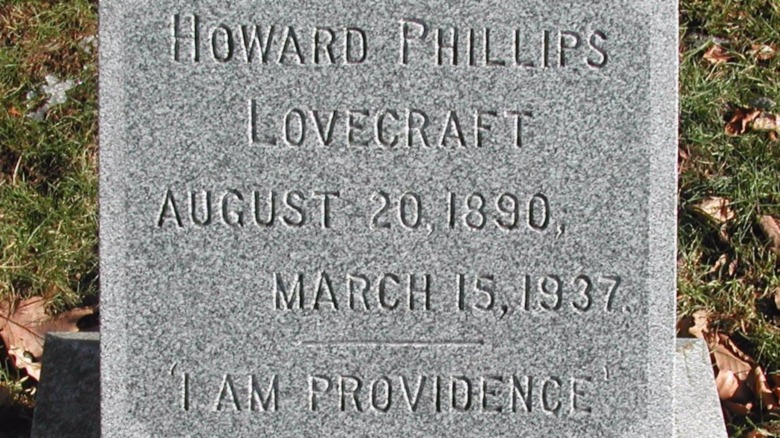The Sad Death Of H.P. Lovecraft
Known for his tales of dark, otherworldly horror, H.P. Lovecraft could have been a character in one of his own weird works of fiction in the final years of his life. He spent his remaining days in his hometown of Providence, Rhode Island, living with his last surviving relative, according to the H.P. Lovecraft Archives. They moved in and out of a series of small, shabby dwellings because of their dire financial situation. Lovecraft earned little from revising the works of others and even less from his stories. He lived like a recluse, staying up late to study and write (via the Guardian). Lovecraft rarely went outside during the day and suffered from malnutrition, which only enhanced his pale, gaunt appearance (via Smithsonian).
Sickly since childhood, Lovecraft's health took a turn for the worse in 1936. He learned that he had cancer of the small intestine and that the disease was too far advanced for any treatment. A lifelong devotee of science, Lovecraft reportedly kept notes on his own declining condition until "he could no longer hold a pencil," according to the Morning News. This so-called death diary remains a bit of mystery, though, as no record of these notes have been found (via JSTOR). After suffering for months, Lovecraft entered the Jane Brown Memorial Hospital on March 10, 1937, and he died there five days later. He was only 46 years old.
H.P. Lovecraft finds fame after death
Nearly penniless when he left this world, Lovecraft seemed destined to fade into obscurity. His works were only known by friends and readers of the pulp magazine Weird Tales. Buried in Providence's Swan Point Cemetery, Lovecraft didn't even have his own gravestone (via The Guardian). His name was simply added to a family monument there. (Devoted Lovecraft fans later paid for a separate headstone for him, which was added in 1977.)
In the hopes of preserving his own legacy, Lovecraft named Robert Barlow, a fan turned friend, as his literary executor (via The New Yorker). Barlow wasn't really up for the task, so other Lovecraft supporters stepped in to promote his strange stories to a larger audience. August Derleth and Donald Wandrei launched the publishing company, Arkham House, in 1939, to distribute Lovecraft's tales of cosmic horror (via Arkham House August Derleth Archive).
Over the decades, Lovecraft's fan base grew and his works influenced the likes of author Stephen King and director Guillermo del Toro among others (via Vogue). In recent years, however, Lovecraft's place in horror literary history has diminished by the blatant racism found in many of his stories (via The New York Times). Still, his unusual creatures and warped fascinations continue to mesmerize audiences as explored in the horror TV series Lovecraft Country, which debuted in 2020.

